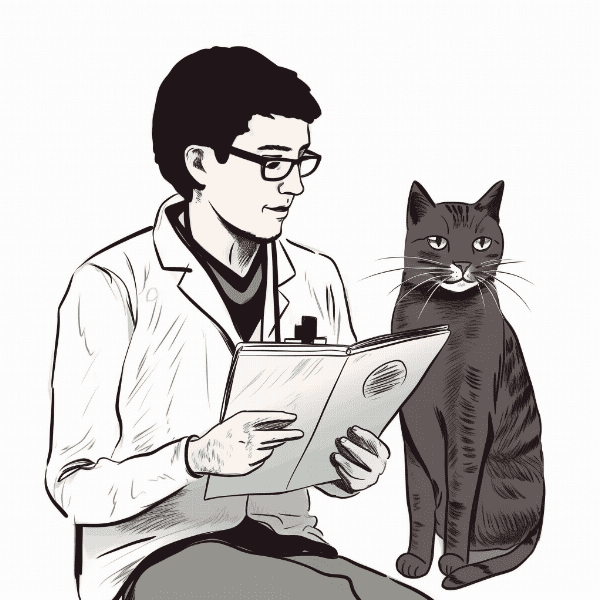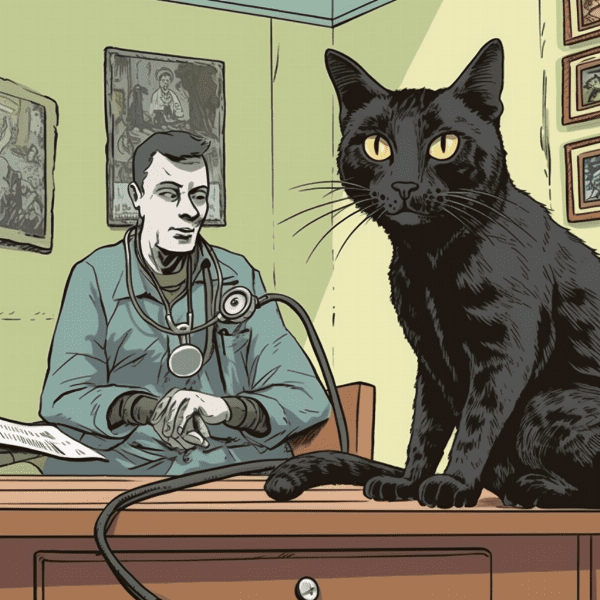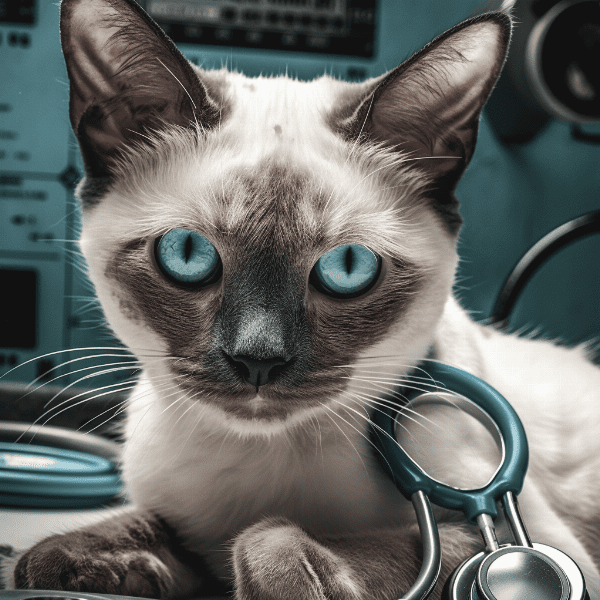Table of Contents
- Understanding Feline Jaw Cancer
- Common Symptoms of Feline Jaw Cancer
- Diagnosing Feline Jaw Cancer
- Treatment Options for Feline Jaw Cancer
- Surgical Interventions for Feline Jaw Cancer
- Chemotherapy and Radiation Therapy for Feline Jaw Cancer
- Palliative Care for Feline Jaw Cancer
- Nutritional Support for Feline Jaw Cancer Patients
- Monitoring and Follow-Up Care for Feline Jaw Cancer
- Prognosis and Outlook for Feline Jaw Cancer
Understanding Feline Jaw Cancer
Feline jaw cancer, also known as feline oral squamous cell carcinoma (OSCC), is a malignant tumor that affects the jaw and oral cavity of cats. The tumor arises from the cells that line the oral cavity and the jawbones.
What causes feline jaw cancer?
The exact cause of feline jaw cancer is unknown. However, several risk factors have been identified, including exposure to secondhand smoke, chronic dental disease, and the feline leukemia virus.
How does feline jaw cancer spread?
Feline jaw cancer can spread to nearby tissues and organs, such as the lymph nodes, lungs, and bones. The spread of cancer cells is known as metastasis.
Who is at risk for feline jaw cancer?
Any cat can develop feline jaw cancer, but some breeds are more susceptible than others. Siamese and Abyssinian cats, for example, have a higher risk of developing oral tumors.
How is feline jaw cancer detected?
Feline jaw cancer can be difficult to detect in the early stages, as cats often hide their pain and discomfort. However, some signs to look out for include difficulty eating, drooling, bad breath, and swelling of the face or jaw.
What is the prognosis for feline jaw cancer?
In summary, feline jaw cancer is a serious and potentially life-threatening condition that requires prompt diagnosis and treatment. If you suspect that your cat may be suffering from this condition, it is important to seek veterinary care as soon as possible.
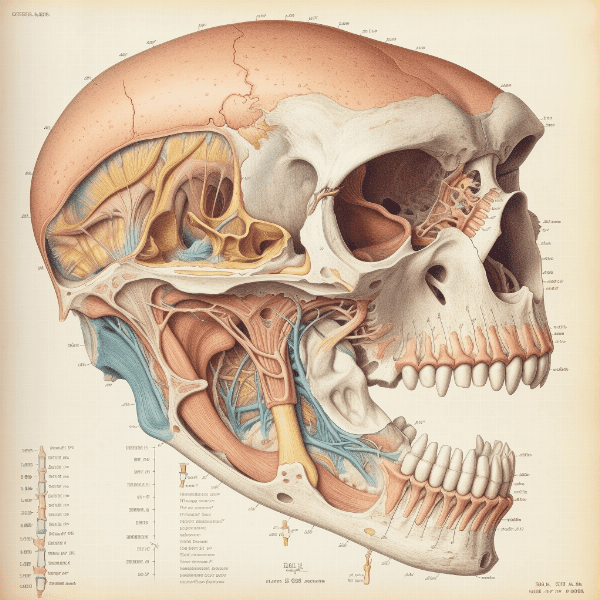
Common Symptoms of Feline Jaw Cancer
Feline jaw cancer can be difficult to detect in the early stages, but there are some common symptoms that may indicate the presence of a tumor.
Difficulty eating and drinking
Cats with jaw cancer may experience pain or discomfort when chewing or swallowing. This can cause them to eat less or avoid food altogether. They may also drool excessively or have trouble drinking water.
Bad breath
Oral tumors can cause a foul odor in the mouth, which may be noticeable even from a distance. If your cat’s breath smells unusually bad, it may be a sign of feline jaw cancer.
Swelling of the face or jaw
As the tumor grows, it can cause swelling in the face or jaw. This may be visible as a lump or bump under the skin, or it may cause the face to appear asymmetrical.
Bleeding or discharge from the mouth
Advanced cases of feline jaw cancer may cause bleeding or discharge from the mouth. This can be a sign that the tumor has invaded nearby tissues or has spread to other parts of the body.
Changes in behavior or temperament
Cats with feline jaw cancer may become more irritable or aggressive due to their pain or discomfort. They may also be less active or withdraw from social interactions.
It is important to note that these symptoms can also be caused by other health conditions, so it is important to have your cat evaluated by a veterinarian if you notice any changes in their behavior or appearance. Early detection and treatment can improve the prognosis for feline jaw cancer.

Diagnosing Feline Jaw Cancer
Diagnosing feline jaw cancer typically involves a combination of physical examination, diagnostic imaging, and biopsy.
Physical examination
During a physical examination, the veterinarian will look for signs of swelling or lumps in the face or jaw, as well as any signs of pain or discomfort. They may also examine the cat’s mouth and teeth for signs of dental disease or other abnormalities.
Biopsy
A biopsy is the most definitive way to diagnose feline jaw cancer. During a biopsy, the veterinarian will take a small sample of the tumor tissue and examine it under a microscope to determine if it is cancerous. Biopsies can be performed using a variety of techniques, including fine-needle aspiration, punch biopsy, or incisional biopsy.
Staging
Once a diagnosis of feline jaw cancer has been confirmed, further tests may be performed to determine the stage of the cancer. Staging helps determine the extent of the cancer and the best treatment options. Tests may include additional imaging studies or biopsies of nearby lymph nodes.
In summary, diagnosing feline jaw cancer involves a combination of physical examination, diagnostic imaging, biopsy, blood tests, and staging. If you suspect that your cat may be suffering from this condition, it is important to seek veterinary care as soon as possible to obtain an accurate diagnosis and develop an appropriate treatment plan.
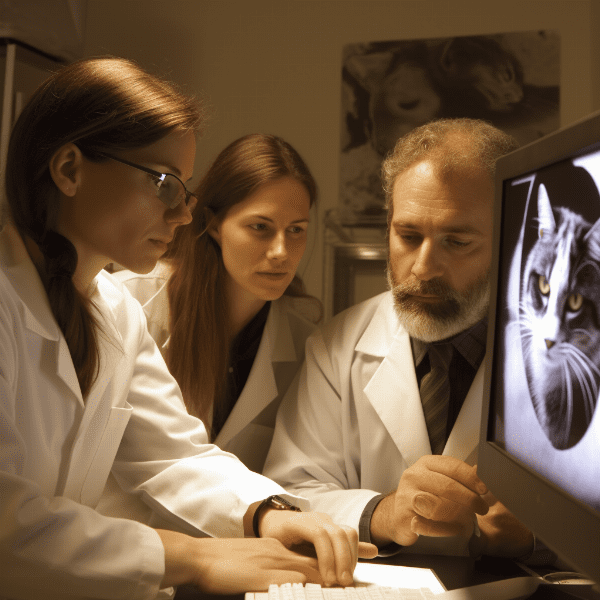
Treatment Options for Feline Jaw Cancer
Surgery
Surgery is often the first-line treatment for feline jaw cancer. The goal of surgery is to remove as much of the tumor as possible while preserving the function of the jaw and mouth. Depending on the size and location of the tumor, the surgeon may remove a portion of the jawbone, as well as any nearby lymph nodes.
Chemotherapy
Chemotherapy may be used to treat feline jaw cancer that has spread to other parts of the body. Chemotherapy drugs work by targeting rapidly dividing cancer cells and preventing them from dividing further. Side effects of chemotherapy may include nausea, vomiting, and decreased appetite.
Palliative care
In summary, the treatment options for feline jaw cancer may include surgery, radiation therapy, chemotherapy, or palliative care. The best treatment option for your cat will depend on several factors, and should be discussed with your veterinarian. Early detection and treatment can improve the prognosis and quality of life for cats with feline jaw cancer.

Surgical Interventions for Feline Jaw Cancer
Maxillectomy
Maxillectomy involves the removal of a portion of the upper jawbone to excise the tumor. Depending on the location and size of the tumor, the surgeon may remove the entire upper jaw (hemimaxillectomy) or just a portion of it (partial maxillectomy). After the surgery, the cat may experience some difficulty eating and drinking, but most cats adapt well to the changes.
Composite resection
Composite resection is a more extensive surgical approach that involves the removal of both the upper and lower jawbones, as well as any nearby lymph nodes. This approach is typically reserved for larger or more invasive tumors.
Complications of surgery
Complications of surgery for feline jaw cancer may include bleeding, infection, difficulty eating or drinking, and changes in facial appearance. Your veterinarian will discuss the potential risks and benefits of surgery with you before the procedure.
In summary, surgical intervention is often the preferred treatment option for feline jaw cancer, as it offers the best chance of removing the tumor and improving the cat’s quality of life. The specific surgical approach used will depend on the size and location of the tumor. Your veterinarian can discuss the potential risks and benefits of surgery with you and help determine the best treatment plan for your cat.
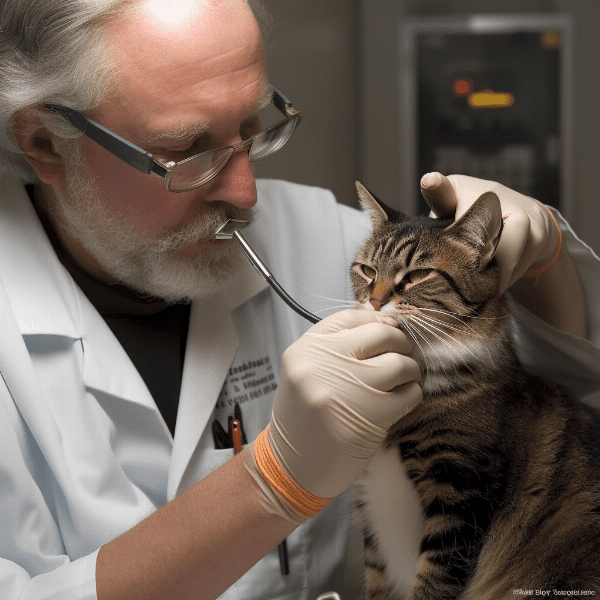
Chemotherapy and Radiation Therapy for Feline Jaw Cancer
In addition to surgery, chemotherapy and radiation therapy may also be used to treat feline jaw cancer. These treatment options may be used alone or in combination with surgery, depending on the size and location of the tumor.
Chemotherapy
Chemotherapy involves the use of drugs to kill cancer cells. The drugs are administered either orally or through injection, and they work by targeting rapidly dividing cells in the body, including cancer cells. Chemotherapy may be used to treat feline jaw cancer that has spread to other parts of the body, or as an adjuvant therapy following surgery to reduce the risk of recurrence.
Radiation therapy
Radiation therapy involves the use of high-energy radiation to kill cancer cells. The radiation is typically delivered in multiple sessions over the course of several weeks, and it works by damaging the DNA of the cancer cells, preventing them from dividing and multiplying. Radiation therapy may be used alone or in combination with surgery, depending on the size and location of the tumor.
Side effects
Both chemotherapy and radiation therapy can have side effects, including nausea, vomiting, diarrhea, and decreased appetite. Radiation therapy may also cause skin irritation, hair loss, and oral ulcers. Your veterinarian can discuss the potential risks and benefits of these treatment options with you, as well as strategies for managing any side effects that may occur.
In summary, chemotherapy and radiation therapy may be used to treat feline jaw cancer in addition to surgery. These treatment options may be used alone or in combination, depending on the size and location of the tumor. Both chemotherapy and radiation therapy can have side effects, and your veterinarian can help manage any symptoms that may occur.
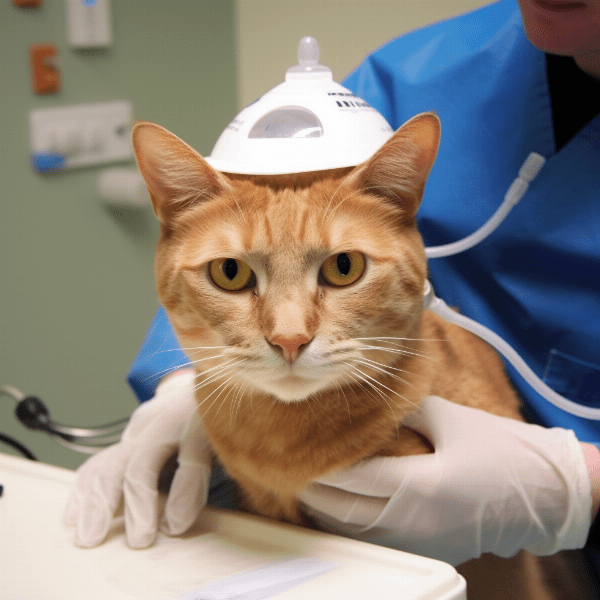
Palliative Care for Feline Jaw Cancer
Pain management
Pain management is an important component of palliative care for cats with feline jaw cancer. Your veterinarian may prescribe pain medication to help manage your cat’s pain. This may include non-steroidal anti-inflammatory drugs (NSAIDs), opioids, or other pain-relieving medications.
Nutritional support
Cats with feline jaw cancer may have difficulty eating and drinking due to their pain and discomfort. Your veterinarian may recommend a soft or liquid diet to help make it easier for your cat to eat. In some cases, a feeding tube may be necessary to ensure that the cat is receiving adequate nutrition.
Supportive therapies
Other supportive therapies, such as acupuncture, massage, or physical therapy, may also be helpful in managing your cat’s pain and improving their quality of life. These therapies can help reduce stress and promote relaxation, which can be beneficial for cats with feline jaw cancer.
Monitoring and follow-up care
Cats receiving palliative care for feline jaw cancer will require ongoing monitoring and follow-up care to ensure that their pain is adequately managed and their quality of life is optimized. Your veterinarian will work with you to develop a plan for monitoring your cat’s symptoms and adjusting their treatment plan as needed.
In summary, palliative care may be recommended for cats with feline jaw cancer that are not good candidates for aggressive treatment or for those with advanced disease. The goal of palliative care is to manage the cat’s pain and improve their quality of life. This may include pain management, nutritional support, supportive therapies, and ongoing monitoring and follow-up care.
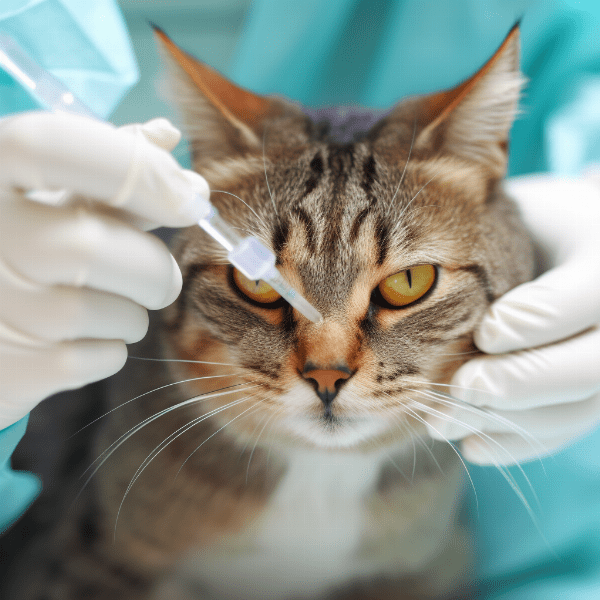
Nutritional Support for Feline Jaw Cancer Patients
Cats with feline jaw cancer may experience difficulty eating and drinking due to pain and discomfort in the mouth and jaw. Nutritional support is an important component of treatment, as it helps ensure that the cat is receiving adequate nutrition to maintain their overall health and well-being.
Soft or liquid diets
Cats with feline jaw cancer may have difficulty chewing and swallowing, so a soft or liquid diet may be recommended. These diets are easier for the cat to eat and can help prevent further pain and discomfort in the mouth and jaw. Commercially available soft or liquid diets may be used, or homemade diets may be prepared under the guidance of a veterinary nutritionist.
Feeding tubes
In some cases, a feeding tube may be necessary to ensure that the cat is receiving adequate nutrition. Feeding tubes can be placed directly into the esophagus or stomach and allow for the administration of liquid diets or blended food. Feeding tubes may be temporary or permanent, depending on the cat’s overall health and response to treatment.
Nutritional supplements
Nutritional supplements may also be recommended for cats with feline jaw cancer. These supplements can help support the cat’s overall health and may include vitamins, minerals, and omega-3 fatty acids. Your veterinarian can help you determine which supplements are appropriate for your cat.
Monitoring
Cats receiving nutritional support for feline jaw cancer will require ongoing monitoring to ensure that they are maintaining their weight and overall health. Your veterinarian may recommend periodic weigh-ins and blood tests to assess the cat’s nutritional status and overall health.
In summary, nutritional support is an important component of treatment for cats with feline jaw cancer. Soft or liquid diets, feeding tubes, and nutritional supplements may be recommended to ensure that the cat is receiving adequate nutrition. Ongoing monitoring is necessary to ensure that the cat is maintaining their weight and overall health.
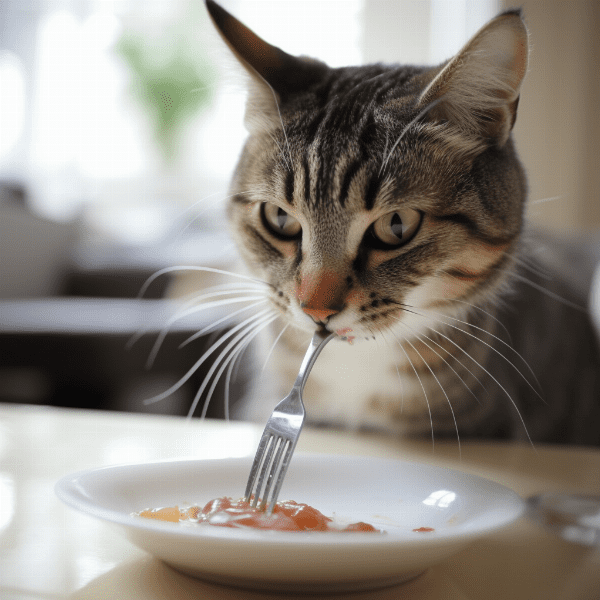
Monitoring and Follow-Up Care for Feline Jaw Cancer
Monitoring and follow-up care are important components of treatment for feline jaw cancer. Regular monitoring helps ensure that the cat’s treatment plan is working effectively and that any changes in the tumor are detected early.
Physical examinations
Regular physical examinations are important for cats with feline jaw cancer. During these exams, the veterinarian will assess the cat’s overall health, monitor the tumor size, and look for any signs of recurrence or metastasis.
Diagnostic imaging
Diagnostic imaging, such as X-rays or CT scans, may be recommended periodically to assess the tumor size and location and to determine if there has been any spread to nearby lymph nodes or other organs.
Blood tests
Blood tests may be recommended periodically to assess the cat’s overall health and to monitor for any changes in blood cell counts or organ function.
Follow-up appointments
Follow-up appointments with the veterinarian are important for cats with feline jaw cancer. These appointments allow for ongoing monitoring and adjustment of the treatment plan as needed. Your veterinarian may recommend follow-up appointments every few weeks or months, depending on the stage of the cancer and the cat’s overall health.
.
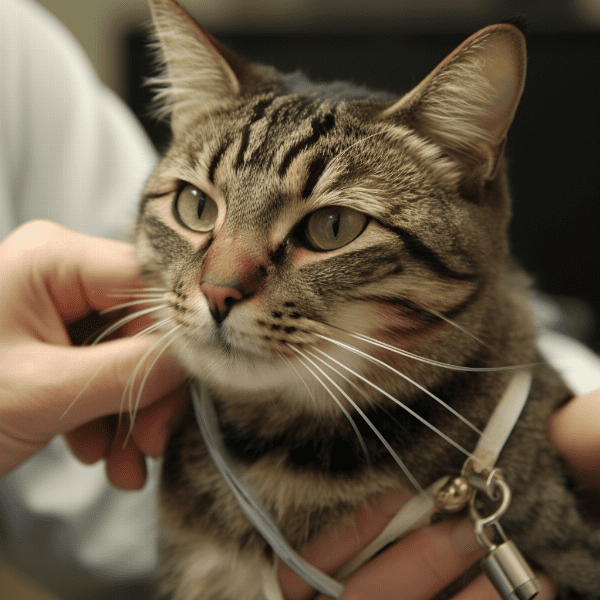
Prognosis and Outlook for Feline Jaw Cancer
Survival rates
The survival rates for cats with feline jaw cancer vary depending on the stage of the cancer and the treatment approach used. In general, cats that undergo surgery, radiation therapy, or chemotherapy have a better prognosis than those that receive palliative care alone. The overall survival rate for cats with feline jaw cancer is approximately 6-12 months, although some cats may survive for longer with appropriate treatment.
Quality of life
The quality of life for cats with feline jaw cancer can be greatly impacted by their treatment and the progression of the disease. Cats that undergo aggressive treatment may experience pain and discomfort, but may also have an improved quality of life and longer survival time. Cats that receive palliative care may experience some relief from pain and discomfort, but may also have a shorter overall survival time.
End-of-life care
In some cases, feline jaw cancer may progress to a point where aggressive treatment is no longer an option. In these cases, end-of-life care may be recommended to help manage the cat’s pain and improve their quality of life. Your veterinarian can discuss end-of-life care options with you and help you make the best decisions for your cat.
In summary, the prognosis and outlook for cats with feline jaw cancer depend on several factors, including the size and location of the tumor, the stage of the cancer, and the overall health of the cat. Early detection and treatment can improve the prognosis and quality of life for cats with feline jaw cancer. The survival rates and quality of life for cats with feline jaw cancer can be greatly impacted by their treatment and the progression of the disease, and end-of-life care may be recommended in some cases.
